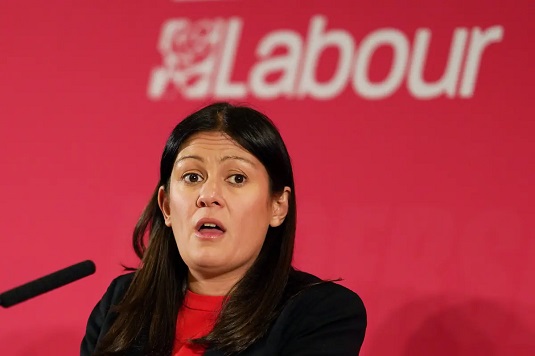
Not really. Noting the disconnect between the local and the global, she talked about how a politics fixated on the narrow horizons of the national fail to appreciate the consequences of actions and decisions taken overseas play out in local contexts. A point reinforced by how conversations about foreign policy is rarefied and removed from these places. I'm sure the irony of giving this talk at Chatham House was not lost on any. However, this "gulf", Lisa argues, is a direct threat to British interests. It has "cost us the support and consent of the British people for our activities overseas, holding back our ability to make positive and lasting change in the world."
Let's unpack what she means by "our ability" for a moment. She understands that the UK state does not have a free hand to act as it pleases on the international stage, but not because of its position in the pecking order. No, what she's alighting on here is the reduced capacity of the state to project its hard power without domestic political repercussions. Since the Iraq War, Britain has had a hard time convincing enough parliamentarians, let alone the wider public that military action is legitimate in all scenarios, and that it has an absolute right to deploy force where and when it pleases. And this goes far beyond the usual suspects of left-liberal voters. Huge swathes of right wing voters are also opposed to military entanglements out of isolationist/taxpayer value concerns. Any politics concerned about restoring state authority, such as Starmerism, has got to rebuild this consent if it wants something of a free hand in the future.
Lisa then pivots back into her Blue Labour comfort zone. Building off incredibly conventional critiques of globalisation, she pines for the vitality the chill winds of globalisation has sucked out of places like Wigan and many other industrial towns and, implicitly, criticises Labour's encouragement of this process when it was in office. Curiously, she obliquely critiques the Tories for allowing this to continue, and taken them to task for sucking up to Donald Trump, even after he took action against UK interests. She also attacks the levelling up agenda, noting the Tories aren't actually offering much to their new constituencies because utilising them to foster more division and resentment is their game.
What does this amount to in practice? Lisa committs Labour to three pledges. A reffirmation of NATO, guarding against Russia, and making security the top priority. She also says the party will "take action to defend our democracy." Given the new leadership refused to even take a stand against political spying, only reluctantly opposed Tory authoritarianism and has since, along with the government, endorsed the clean bill of health handed to the Metropolitan Police, this sounds a mite unconvincing. Second we have taking action to rebuild the country's economic security, and lastly climate change has to be the relentless focus of foreign policy. Fairly innocuous. The state achieves these aims by not flouting rules or sailing close to the wind of international law, but by building a better relationship with the EU (Lisa's careful to blame this on the "needlessly antagonistic approach pursued by both sides"), and working to strengthen multilateral institutions, tackling dirty money as it sluices through the City, and starting a new "national conversation" about Britain's place in the world.
There are a couple of things about this. Apart from the CLR James reference early on there's nothing, nothing to differentiate this from the windy rhetoric gusting out of the Foreign Office at any point these last 11 years. Or, for that matter, the decades preceding it. Even Dominic Raab can voice concerns about the retreat of liberal democracy and gesture towards the international rule of law when occasion demands. Lisa's argument, stripped of its flim-flammery, boils down to a more confrontational attitude to Russia and China and repairing popular consent for future military adventures. The differences between her and the Tories are of degree and not of kind, so promising more tea and biscuits sit-downs with the EU and more lip service to multilateralism represents nothing more than managerial and process criticisms of Tory policy. By sticking to the received foreign policy frame, Lisa is signalling the same old crap will carry on. Whatever happens at home, Keir Starmer's Labour are committed to maintaining the international pecking order as is and the UK's privileged position within it. There is no danger of the interests of British business getting compromised by severing relations with a dodgy but loyal regime, or taking the international rules based order discourse seriously. Lisa had one job, and that was to affirm Labour's fidelity to the realpolitik of the status quo. And she managed it.
Image Credit
Still preferable to Corbyn (guided by Milne) sucking up to Putin, eh?
ReplyDeleteThat did not happen.
Delete